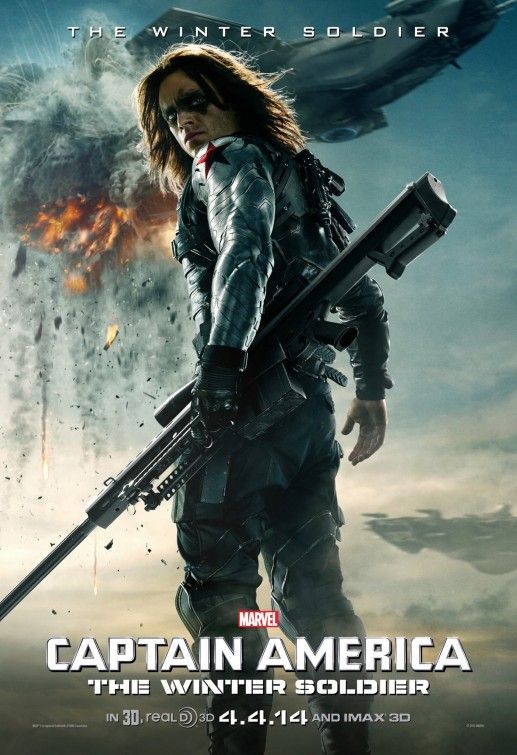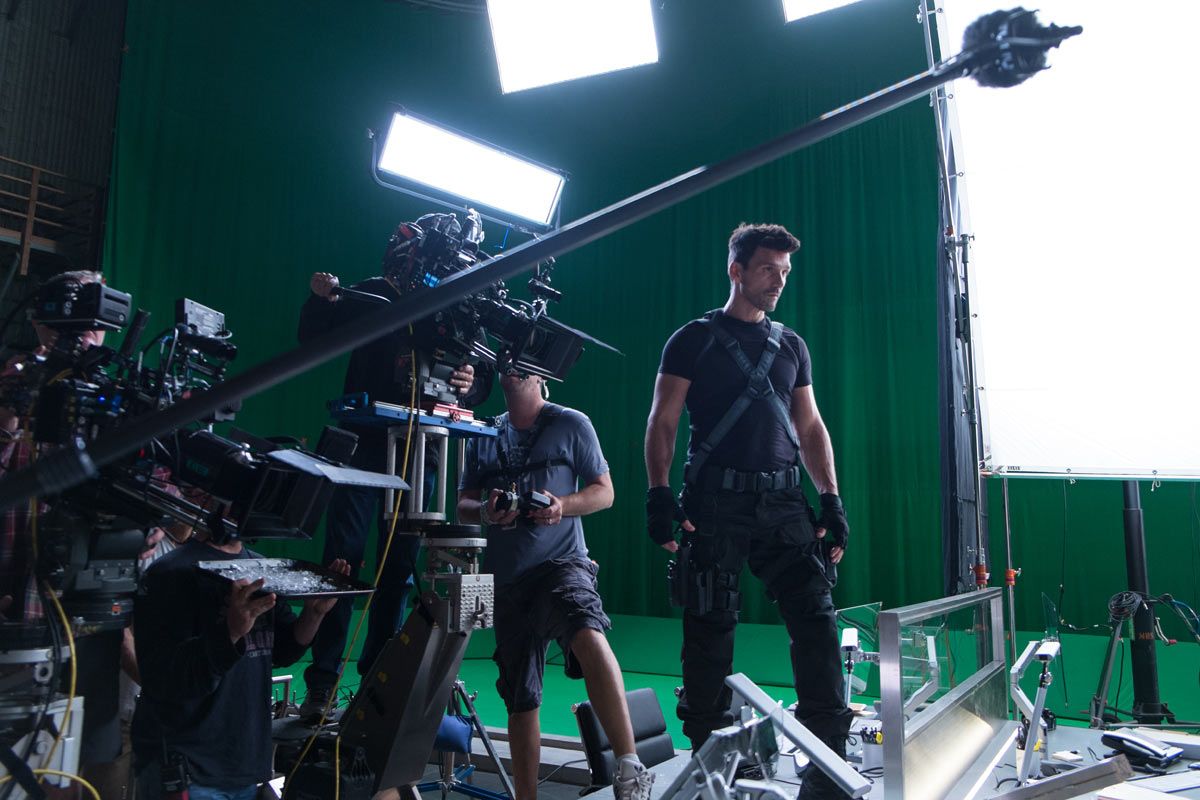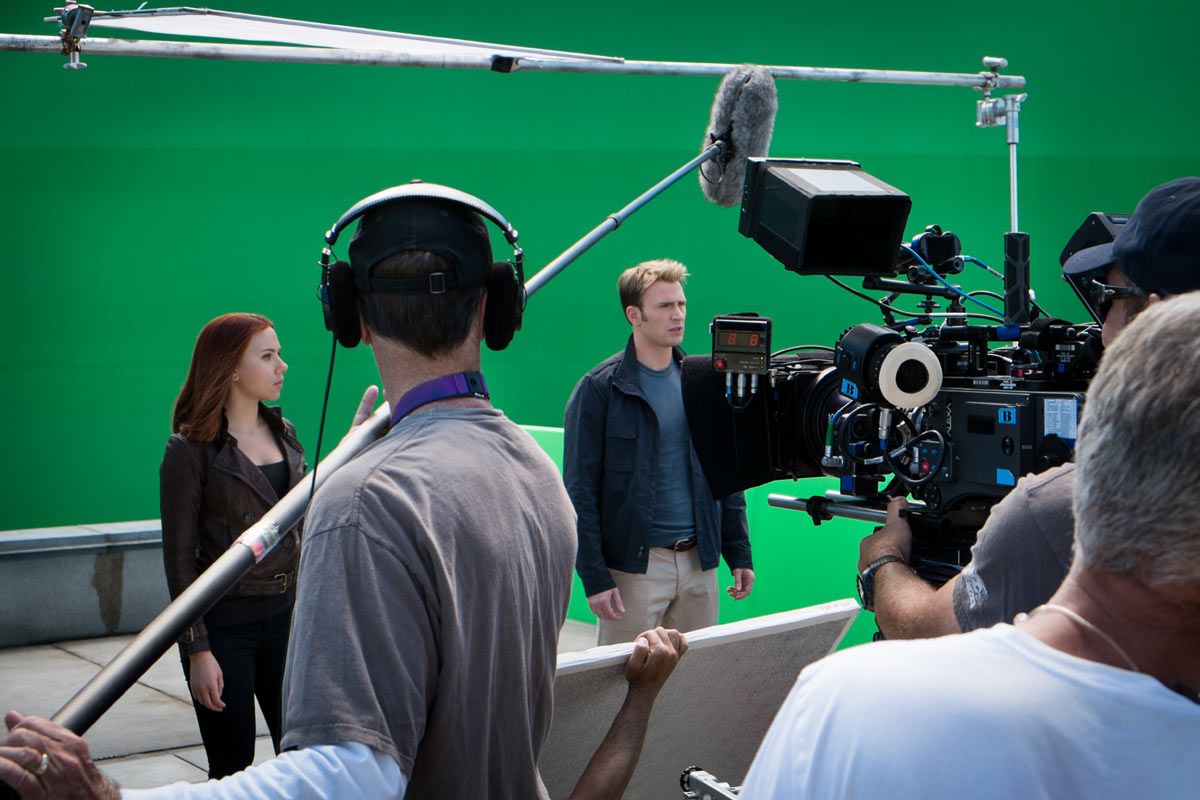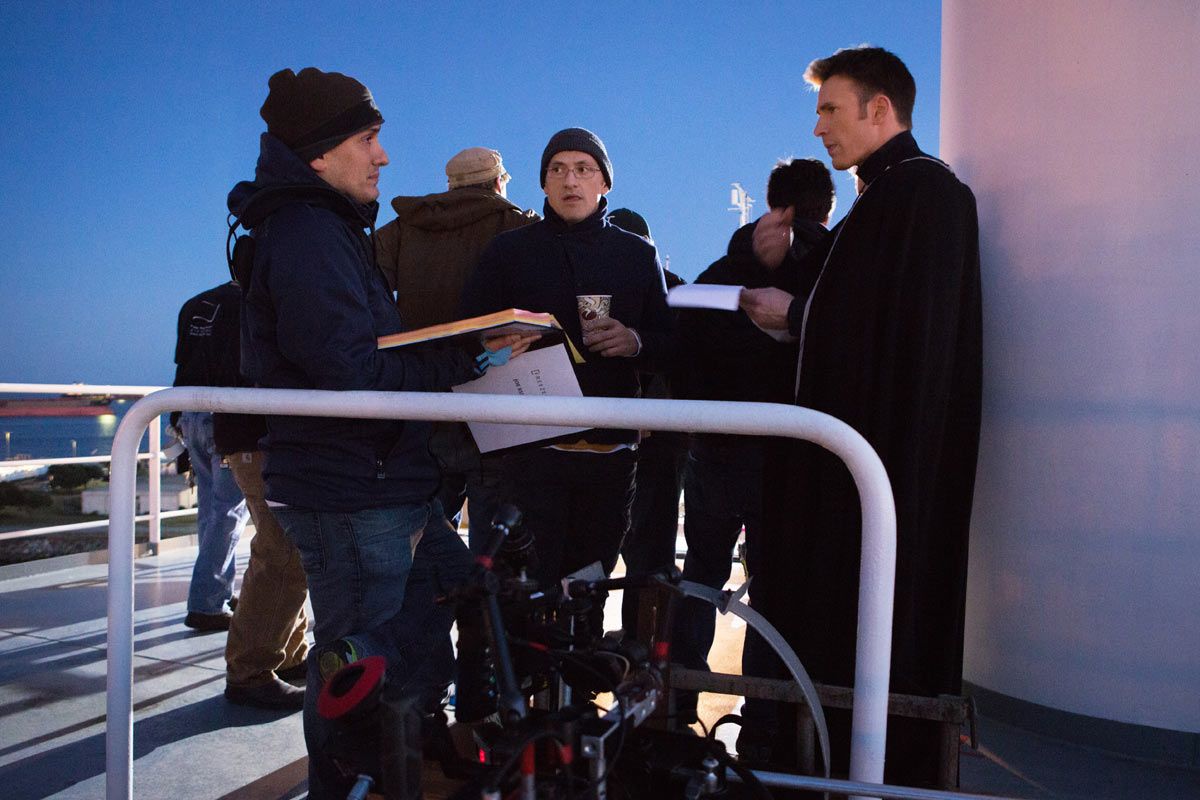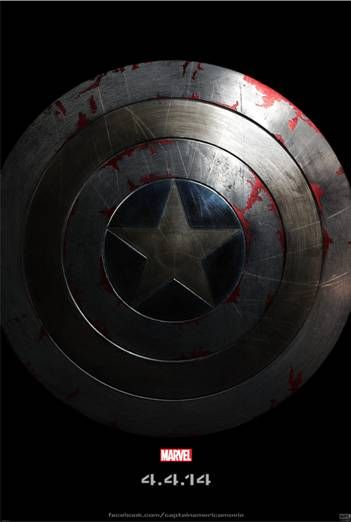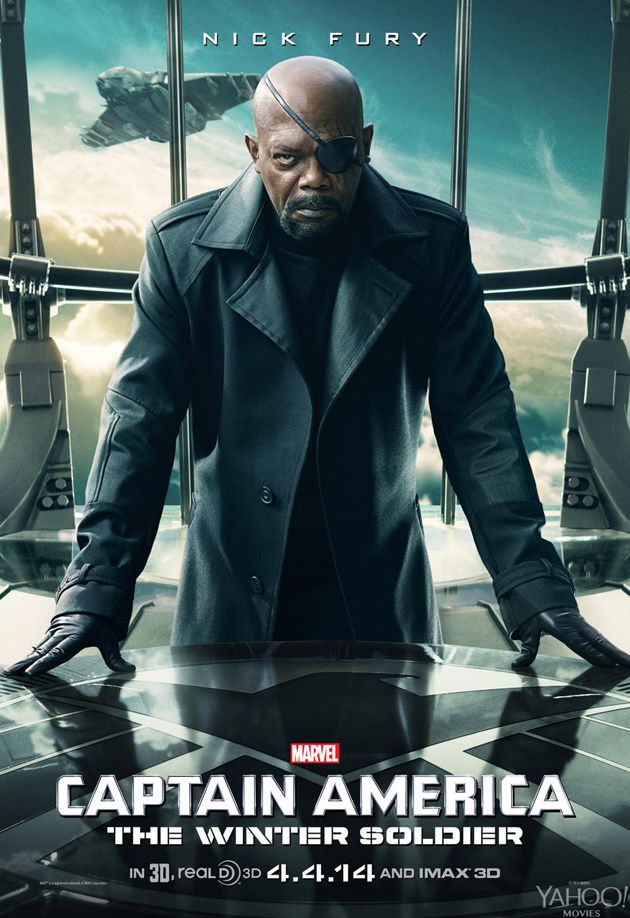Feige Says "Captain America: The Winter Soldier" "Plays on Multiple Levels" | Anthony Mackie Soars as "Captain America: The Winter Soldier's" Falcon | Co-Writers Markus & McFeely: "Winter Soldier" Will "Punch You in the Face"
Joe and Anthony Russo may be the two most beloved filmmakers that you've never heard of. Their directorial credits include work on some of the biggest cult shows of the last decade -- including "Arrested Development" and "Community." But in 2014, they hope to make a break into the mainstream unlike any they've experienced so far, with the release of Marvel Studios' "Captain America: The Winter Soldier."
Feige Says "Captain America: The Winter Soldier" "Plays on Multiple Levels"
Of course, the duo hardly seems an unlikely candidate for a massive comic book movie sequel, given their concentration in television comedy -- not to mention their intended approach involves turning that inevitable blockbuster into a gritty political thriller. But as Joe and Anthony told CBR News, they devoted a massive amount of time and thought to this transition they're eagerly making, as well as to how to best approach the character. CBR joined a small group of press to visit the set of the film in the summer of 2013, where the Russos allowed us to watch several scenes be shot, and then sat down to discuss their work on "Captain America: The Winter Soldier."
What were your first conversations with Marvel? Did they come to you for general ideas, or was it Captain America?
Joe Russo: It was specifically Captain America. We had a call from our agent who said that Kevin [Feige] was a big fan of "Community" and we could come in and meet him on Captain America. Obviously, we jumped at the chance. Set up a meeting, came in-they were interviewing a lot of directors at the time, it was an exhaustive search, real competition. We had to come back for multiple meetings. The conversations were really just about our passion for the material, that [joined] up with our love of comic books and our loves of '70s thrillers. I just think our passions translated after a couple of rounds.
Were you surprised that you landed on Marvel's radar?
Joe: You know, it's interesting. We've been doing this for a long time and worked with just about everybody in the business. Kevin is just truly one of the most interesting people I've ever worked with in the business, probably one of the only people I've ever come across who could have pulled off a movie like "The Avengers." He knew how difficult it is to line up those kinds of salaries and stars, get that material pushed through, have ownership of that material, have control of the material -- quality control -- to the extent that he did. It's almost impossible. As a fan of this stuff, I've known for years. My brother and I, when we first got into the business, we tried to get the rights to "The Lord of the Rings" -- there was a period in the '90s when they were available for a second. And we just know how difficult it is to take that kind of material and turn it into something of that scale. I think he had seen the paintball episode of "Community." He thinks outside of the box: "These guys get action. Clearly, they're skewering genre on the show, so they have an understanding of genre and its construction. They have a secret love for it," which we did. And he brought us in for a meeting and we talked about it.
What are some of the challenges and advantages of coming into the Marvel Cinematic Universe that already exists in its own right-to make something new?
Joe: There hasn't been any real challenges for us, to be honest. I know it sounds crazy. Really, it's been all advantages. It's great material, great actors who understand their characters. We got to reboot a bit on the tone, which was great. Almost everything, all the ideas we came with to the table, are in the movie. That so rarely happens that way. Creatively, it's been a very rewarding film for us. It's the most fulfilling job we've had in our careers. "Arrested Development" was a struggle. That was a very difficult show where the studio was not supporting us. It was a red-headed step-child when we were making it, there were quotes that were thrown our way that were vaguely insulting while we were making the project coming from the network. So it was made under conflict and controversy. I think that show became what it became because the three of us -- me, Anthony and Mitch [Hurwitz] -- had nothing to lose at that time. So we said, "All right, we'll make it as radical as we want to because what do we care? They already don't think the show's going to work." That's one environment to work under. This has been the exact opposite of that. It's been support and real infrastructure.
Anthony Russo: We got real lucky because this project was sort of sitting in a sweet spot in that we loved everything that had come before, but at the same time they wanted to go somewhere completely new. For us, it was like what we inherited was all good, and where we took it had a lot of freedom. It was great.
When you guys work as directors, are you two halves of the same mind or do you have certain strengths: one guy's better technically, one guy's better with the acting?
Joe: The same answer we always give is that there's no formal division of labor for us. We've been doing it a real long time with each other, since 1994 -- almost 20 years. It is a little bit like a Vulcan mind meld. We always say there's no formal division of labor, it's really who has the most energy to get out of the chair and give the note at that moment is the one who gets up and does something.
Anthony: "You go. "No, you go." "No, you do."
Joe: But we've even gotten to the point where now we just sit at the monitor and yell stuff out. It's a very loose set with us. We always say we don't have to double-cover us. If somebody shows him a set plan, it's as good as both of us seeing it. Him having eyes on it is as good as both of us seeing it because he'll explain to me what we're doing and vice-versa. When we were working on multiple TV shows, we had to adapt that attitude anyway because it's impossible for one person to run back and forth so we would switch back and forth constantly. He would let me know what was going on when he was on "Community," I would tell him what was going on in "Happy Endings," and then we'd switch. It's a real good partnership. Keeps us level.
But on a production of this scale, is having two of you more of a benefit than if it's just one?
Anthony: It's an interesting question, yeah, because there is so much to do. But the fact of the matter is the movie was so thoroughly prepped that plenty of that was in good shape very early. So there was a long process, a really thoroughly considered process, of prepping and executing this movie. It was very comfortable. You always get into situations during productions where you're trying to buy a little extra, so having two of us helps steal some extra stuff now and then because we can run splinter units more easily. That's definitely helpful. With so many people involved, I can kind of imagine if you have a good partner, it helps.
In this film, Cap teams up with a lot of new characters, a lot of old characters. Is there a core relationship in this film that's really the center of attention?
Joe: Look, the core is Cap's relationship with himself, really. That's the essence of the movie: Cap's relationship to the modern world. Within that, then you have sort of concentric or overlapping circles of relationships. There are people that he's saying goodbye to, there's new friends in Sam [Wilson, the Falcon]. There's potential for new relationships. He has a very strong relationship with [Black] Widow in the movie. I think his two strongest relationships in the movie would be Sam and Widow. He and Fury have a great relationship, but it's combative.
Anthony: Cap is very much the central figure in the story, so all the strong relationships in the movie are in relationship to Cap. Everybody in relation to him.
Joe: He goes on a very personal journey in this movie, obviously. And we all know the story of the Winter Soldier. It's very operatic in its sort of construct because it's talking about your best friend is a villain. With Kevin, one of the first things we said to him is, "If you're going to do the Winter Soldier story, you've got 'Star Wars' on your hands," because so rarely do you every have a hero who has an emotional connection -- that kind of emotional stakes -- with his adversary. It's almost never. I think that's sort of the genius of [Ed] Brubaker's storyline is it's [Captain America's] best friend -- his brother, really.
With Cap as the central figure, is he in every single scene? Do we get to see the other characters pair off as well?
Joe: No, we get to see the other characters -- not in every, he tries a lot of the movie, clearly it's his film -- but there is a sort of little storyline that's playing out within S.H.I.E.L.D. Earlier parts of the film are sort of moving back and forth between those two story lines until they intersect, and then Cap takes over the movie.
Tell me about the casting of Anthony [Mackie], and I don't know if 'pressure' is the right word, but is there more to consider with casting because he might be in an "Avengers" movie one day?
Anthony: One thing Kevin always does, which is awesome, is he doesn't think too far down the line. He likes to keep very focused on what's happening. That's a great thing. Of course, you have to be very mindful of the possibilities in the future, but if you get too far ahead of yourself, you're not serving the moment. At any given moment, it's about the movie that's being crafted at that particular time. We just fell in love with Anthony Mackie for this character because he has an energy and a sense of fun. Cap's coming from a very difficult place in this movie. He's basically a guy who wakes up in the modern world, it's maybe a year or two after he's come out of this state, and his whole world is gone. He's a guy who's lost everybody. It's just a very severe emotional, psychological place to be in. And Anthony Mackie just sort of has a wonderful energy that we just thought, if he's going to form a new friendship, he needed somebody like that to sort of pull him into the present.
Joe: There's a maturity in the performance, a charm and a sense of humor, that sort of draws Cap out. Which is great because it give him something to play off of that is a different shade, a different tone, then he's played with in the past.
What are some of the other pros and cons of being part of the bigger Marvel Cinematic Universe? How do you plant the right Easter eggs here and there, without getting too distracted by it?
Joe: The fun part of that is if you are a comic book geek like me, you get off on that stuff. That's the exciting component of it: what can we set up for the future? You're constantly pitching out ideas that not only affect your movie, but may have a ripple effect that affects other films. And then Joss [Whedon] is reading the "Thor" script, the "Cap" script, and going, "Okay, this is where I'm getting the characters and this is where I have to pick them up." It's a weird sort of tapestry of writers and directors working together to create this universe that's sort of organic. It's not structured. Of course, there are things that you can always go borrow from the story lines in the book, but it stays very fluid in the process.
Anthony: Also, I think it comes very natural to us because the work we did for "Arrested" and "Community," we played with a lot of foreshadowing and callbacks --
Joe: Layering --
Anthony: Tracking that stuff over a season of television, or multiple seasons -- it's something we're sort of patterned for anyway. I think that's one reason why we made a nice fit here at Marvel, we understand how you take a larger story and wrangle in into a moment, yet keep them connected.
Was there a scene or an aspect of the movie that really excited you?
Joe: Absolutely. Look, we are action nuts. We study action movies. My DVD player, or my Apple TV, lives in quarter-speed. I watch things and try to dissect them. That's what was so exciting about "Community" for us, is we were constantly skewering genre. We're genre nuts. So there were a couple of action sequences that we knew were going to be really complex. We wanted to bring some style of action that maybe hasn't been seen in American movies in a little while, a style of fighting and intensity that we really feel. Taking hits, a very visceral execution of a lot of this stuff. We had a huge sequence where we shut down the freeway for two weeks. We always knew that that would probably be the most difficult part of the shoot, not only because of the length of the action sequence, but just fighting the elements: being outside, sitting out on set while they're all enduring traffic for a movie. Those sequences were the ones we'd get the most excited about because one of our big pitches to Kevin, one of the things that really attracted us to the movie, was the ability to come at it with a fresh point of view really on the action front. It's very gritty. We're working with Spiro Razatos, who's done all the "Fast" movies, as the second unit director, and the three of us got really engaged in how far we could push things, how aggressive can we make them look? We have some cool car chases in the movie that are very influenced by '70s chases, "Live and Die in LA." I'm a huge fan of "Ronin," I think that movie's genius. [John] Frankenheimer schooled everybody as an 80 year old: "This is how you do it." So it's got a lot of that. I think "Ronin" might be the biggest influence on the car stuff in the movie, just in terms of the sound work that he did back then, the aggressiveness of the camerawork. How close can we get the cameras to the cars? A few cameras were destroyed in the process, you know. But it's all about pushing it, pushing it, pushing it.
Anthony: Really, what most excited us was just how do we come up with these great action set pieces that play to Cap as a character in the best possible way? Looking at him and how he's unique in the Marvel Universe, what sets him apart. And that he's a man, only more so. He's not flying across the sky or transforming into something else. So we sort of came up with an approach. We wanted to do a hard-hitting, hardcore realism version of what a superhero movie could be on an action level.
Joe: So you literally have to execute that. There were a lot of bumps and bruises for the stunt guys, for Chris [Evans]. A lot of punches thrown, a lot of hits taken. A lot of violent stunts where guys are getting thrown 20 feet into a car window, then having to get up and walk away from it. So as Anth mentioned, that's sort of for us what we were excited about with Cap. You could literally execute this stuff. It's not Iron Man where he lives in a virtual world and most of that fighting is done after the fact.
Do you get creative with the shield?
Joe: We do get creative with the shield. That was a big thing for us. The approach for us for Cap was this: In the '40s, it makes sense. He's off the streets. He'll fight like John Sullivan. It's that style of big swings and the shield is very pronounced because he hasn't necessarily been trained yet. Now that he's in the future and he has a fast mind -- it's part of what the serum does to him -- and a tactical mind, he learns things quickly. So for us, our approach was he would absorb everything in that year, year and a half. All the training he could possibly get, and all the tools at his disposal would be affected by that training. There's some interesting moments with the shield where he uses just one handle on it in more of an Eastern style to fight people. Those are things that excite me about the character. I like post-modern, you know, when [Frank] Miller released "The Dark Knight Returns" when I was 12 or 13, it blew my mind, changed my whole approach to comic books. I like the post-modern deconstruction of heroes. It just feels to me like there's more layers there for the character. Included in that would be how do we make Cap modern, how do we make him feel modern. That's what I like about the MCU versus the comic books. Look, I've already read it. I don't need to see the literal interpretation of that. My imagination's pretty good. I can sit at home and figure that stuff out. I want to go see something fresh. If we didn't support people like Brubaker, we'd never have the Winter Soldier storyline, which I think is one of the best comic story lines of the last 50 years. That's the way we approached this movie, was how do we deconstruct it? How do we put him in a new place that would appeal to people of similar tastes?
Talk a bit more about S.H.I.E.L.D., it sounds like they have a pretty major role. What's your take on Nick Fury and Maria Hill, since we met her in "Avengers," but we don't know much about her as some of the other characters that you're inheriting.
Anthony: The relationship, if you go back to the relationship question, here too the relationship between Cap and Nick Fury is really rich and complicated. These two guys are very different animals. The plot sets them up in a way where they really have to confront their differences and sort it out, and it's a messy process. But it's all wrapped up in terms of "What is S.H.I.E.L.D.?" -- what Cap started fighting for in the first place and what that organization is, what that mission sort of evolved into different incarnations into.
Joe: The heart of the movie is how does a character with a code like Cap work for a clandestine organization that has a very subversive agenda. Can they co-exist together? Nick Fury represents the organization and Cap is Cap. Being a political thriller, you want to turn the gas up on that as high as you can, because that's where you're going to get the political thriller component, that's where you're going to get the conflict of the movie. Cap to us is like Rocky. He's a very clean character in terms of his code. It's very open, it's very obvious to you. He doesn't hide anything. As an audience member, similar to Rocky I want him to win for that reason. I like that he wears his heart on his sleeve. I find it endearing especially in today's world to have a character who doesn't hide anything and tells the truth and sees truth as an important component to being a human being. This movie puts him through a lot. He really gets the shit kicked out of him in this film. For us that was important because the harder he fights to earn it the more you care at the end of the movie that he won... that he earns what he gets. So that's sort of the relationship between S.H.I.E.L.D. and Cap.
Can you talk about Chris [Evans]' role in evolving the character and what you rely on him to take care of?
Anthony: We relied on him a lot. We pitched him the idea of how we saw Cap transforming in this movie and how he's been spending his last couple years in terms of throwing himself into the modern world, training extremely hard -- that was all stuff that really excited him. He ran with it. He had to do a lot of heavy training for this movie that wasn't in his wheelhouse yet. I think that really got him going. It's really helpful. Chris is great. We talk to him a lot; he understands the character really well. We talked to him a lot about how the character moves through the beats of the story, we talked to him through the writing process. He wants to direct himself, so he doesn't only think from an actor's point of view. He also likes to look at things from a producorial point of view or a directorial point of view. So it's nice to talk to him about that kind of stuff. He's very helpful in how we craft the movie and his character.
Joe: He's a very clever actor and he really embraced the concept and the direction we're going in. He worked his ass off training. He worked for months. He's in great shape for this film and he executes a lot of the fighting on his own. Like I was talking about with "The Raid," there's a visceral quality in actually seeing the actor executing the fighting in the movie makes it more engaging to you. There are points where we wanted him out of his mask so we could have that experience where you're watching and you go, "Oh that is him. Jesus." He does a fantastic job.
Can you talk a bit about the suit changes and the redesign?
Joe: For us, again, the design approach we took with the suit was that he's thrown himself into working for S.H.I.E.L.D., he's committed to it at the start of this movie. If he is going to work for this organization... just imagine an organization where you're not just dealing with Chitauri and aliens. You're dealing with hostage crises and terrorists, situations that he would be necessary for. He's probably out there every day being sent into some operation somewhere in the world. So we wanted a suit that would reflect the reality of him being an operative on that level for this organization. Obviously it's also thematic for us because it's not his traditional suit -- it's the Steve Rogers suit. For us the reason we went in that direction is because that tonality of the suit works for different missions.
Anthony: It was inspired by the best military effort we could make today, what would he be wearing?
Joe: We didn't want him in any sort of fabrics. The suit is made of Kevlar -- it's bulletproof. That's its job, it's supposed to prevent him from getting shot. So it has to have a real functionality. That's all we kept saying to everybody -- if there's a design element and it's not functional take it off. It has to be functional. If I was going to design this for world war combat that's what it needs to be. So that was our approach to the suit, because that's where the movie starts, in a very grounded place. There's a thematic shift in the film, and you'll see as the movie progresses. I can't talk about where we go from there, but there are various speculations online. It has a thematic arc.
Did you take any fan input in regards to the suit? Earpieces, no earpieces? Where the wings go?
Joe: You always try to listen to fans because you're making movies for them. Coming from "Arrested Development" and "Community" where you have these ravenous fan bases, I'm always reading the message boards just to get ideas from people. I have a very clear sense of taste, what I know I like about the comics and what I want to see. I want to see his ears -- I don't like his ears being covered up. For me it was a big thing, so we fought for that. I know fans are split on that. You'll never be able to please everybody, so you just have to go with what your taste is and what your gut is. You always find that's the best recipe for success -- there's a strong point of view to it and it's not a diluted point of view. So we made strong choices and hopefully people dig them. But at the end of the day I know that I will sit back and enjoy the choices that I've made.
What about casting Robert Redford? What was it like meeting with him initially and working with him on the set?
Anthony: It was incredible. Other than being a fan of his as an actor, his movies having an enormous influence on us, we also came up through the independent film route in the late '90s. We went through Park City. We weren't at Sundance, but we were at Slamdance with our first movie. That was how we got into the business. So it's kind of like the whole phenomenon that he's begun... you couldn't have a larger presence in our filmmaking.
Joe: We owe our careers to him because that's where we got our exposure, in Park City.
Anthony: It was really special. And considering the specific genre and pedigree of this movie... to be able to cast him in this movie, in a political thriller, a movie that's aspiring to the best of what the '70s thrillers did, it's really incredible and it's powerful when you watch it in the movie. It's a trigger. You have this place in your psyche that he sort of occupies when you go into political thriller mode. You just respond to and light up to him in a way that's really special. And when you bring someone new into the Marvel Universe they need to be somebody strong because there's just strong characters everywhere, and we couldn't find better than him for that character.
Can you talk about the dynamic between Cap and Black Widow a little more? Obviously we saw them together a little in "Avengers," but where does that relationship go?
Joe: It's what we're playing with for Fury as well. She's a character who lies for a living. That's what she does. He's a character who tells the truth. Put the two of them together...
Anthony: Give them a problem and they'll have different ways of approaching it.
Joe: Exactly. She's pushing him to modernize, and he's pushing her to add a certain level of integrity to her life. Chris and Scarlett, this is their fourth movie together, and they have amazing chemistry and their scenes are fantastic. They're really great together, and it's a very combustible relationship.
Since you guys have been attached to the project, how much has the script changed?
Joe: The initial sort of story arc is there. We did a lot of work just putting it in a voice. I think we edged it up a lot more, we came up with a lot of the set pieces just based on our love for '70s set pieces. They have a certain length to them. It's a journey that you go on when you watch them. They're story based -- there's something at stake for four-and-a-half minutes while you're going, "Holy shit! What's going to happen here?" So we just did a reworking in that regard. But they had an excellent construct to the script that was very sound in where it was going and had some big ideas that they're exploring in the third act of this movie. It's sort of a monumental idea for the MCU.
Something that's going to affect everything?
Joe: Yes, it's going to affect everything. That has always been there. It was easier to do the script work because it had such a strong spine. We were already playing with the themes that we wanted to push into it more. I relate to those themes of Cap and the loneliness that he feels, that sense of isolation that he has. That makes him an extremely endearing character. So we wanted to push those as far as we could. Again, in a political thriller you have to care about the guy. If you watch "Three Days of The Condor," the first 10 minutes are all about Robert Redford being as charming as possible, and then the next 80 minutes are about "is that charming guy that you really like going to get killed by some really gnarly people?" It's a similar construct. We just try to get you to care as much as you can about Cap and then we put him in jeopardy for the rest of the movie.
In prepping for the movie were you able to do some fanboy indulgence, maybe sit down with Ed Brubaker or Stan Lee or anyone like that?
Joe: Absolutely. We had dinner with Brubaker -- that was one of the first things we did when we signed on -- [to] make sure that we had his blessing. He's a brilliant writer and we wanted to pick his brain about where the character came from and what he was thinking and the themes behind the character. We were in contact with Brubaker all along and there's even a Brubaker Easter Egg somewhere in the movie. Stan Lee we didn't get to meet with until he did his cameo. But he was fantastic.
valnetvalnet
"Captain America: The Winter Soldier" opens on April 4.


